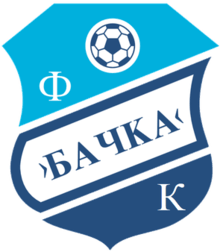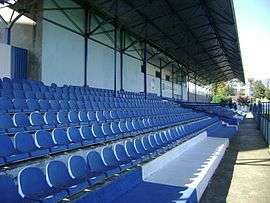OFK Bačka
OFK Bačka (Serbian Cyrillic: OФК Бачка) is a football club based in Bačka Palanka, Serbia. In 2016, the club achieved promotion to the Serbian SuperLiga. "Bačka" is one of the most successful football clubs in Serbia at the eternal table Yugoslav Second League. Bačka Palanka (Serbian: Бачка Паланка, pronounced [bâːtʃkaː pǎlaːnka]) is a town and municipality located in the South Bačka District of the autonomous province of Vojvodina, Serbia. It is situated on the left bank of the Danube. In 2011 the town had a total population of 28,239, while Bačka Palanka municipality had 55,528 inhabitants.Its name means "a town in Bačka" in Serbian. The word "palanka" itself originates from Turkish language and means "town". This word was also adopted by Serbs and it is used in the Serbian language with the same meaning. Older Serbian names for this town were Palanka (Паланка), Stara Palanka (Стара Паланка), Nova Palanka (Нова Паланка) and Nemačka Palanka (Немачка Паланка).
 | |||
| Full name | OFK Bačka | ||
|---|---|---|---|
| Nickname(s) | Plavi sa Dunava (The Blues from Danube) | ||
| Founded | 1945 | ||
| Ground | Stadion Slavko Maletin Vava | ||
| Capacity | 4,000 | ||
| Chairman | Marjan Rnić | ||
| Manager | Dejan Rađenović | ||
| League | Serbian First League | ||
| 2019–20 | Serbian First League, 4th (Promoted) | ||
| Website | Club website | ||
|
| |||
History in Socialist Federal Republic of Yugoslavia and Serbia/Montenegro Period
The club was founded in 1945 and plays in the stadium Stadion Slavko Maletin Vava, capacity of 2,500, which was officially inaugurated on 7 July 1951. In 1959, Bačka achieved promotion to the Yugoslav Second League group East, but, at the end of the 1959–60 season, ending up being relegated. However, a bright sign was the fact that Bačka striker Petar Remete became league top-scorer in 1960.[1] Bačka returned to Second League in the 1961–62 season and this time stayed in the national second level for 14 consecutive years.[2]
Its major accomplishment was the promotion to the 1988–89 Yugoslav Second League which was a unified second league. This edition of the Second League, compared to the previous ones Bačka played in, was stronger because it was a unified Second League in which clubs from all over Yugoslavia played in, thus more restricted and difficult to qualify to, while the other editions from the 1960s and 1970s had the second league divided into two groups, East and West. In total, during the Yugoslav period, Baćka spent 16 seasons in the Second League.[2]
In the Yugoslav Cup, Bačka best performance was in the 1968–69 edition when Bačka reached the quarter-finals, not advancing further because they were stopped by one of the Yugoslav "Big Four", Hajduk Split, who got to eliminate Bačka by 2–1 only after extra-time. Bačka managed to qualify to the final stages of the national cup on several occasions, the next being in the 1993–94 FR Yugoslavia Cup when they lost in the last 16 against Radnički Niš.[2]
After the 1988–89 season in the Second League, during the following two decades, the club played mostly in the third national level, the Serbian League Vojvodina, occasionally dropping to the Bačka Zone League at times when the financial crisis in the club was more notorious.
History in Independent Serbia/Modern Times
The rise started when Bačka won the 2012–13 Vojvodina League West. Immediately afterwards, Bačka won the 2013–14 Serbian League Vojvodina thus qualifying to the Serbian First League, the second national level.[2] It only took two seasons in the first league for Bačka to finish second in the 2015–16 edition and this way directly qualified for the Serbian SuperLiga. The 2016–17 Serbian SuperLiga was the first time in the club's history that Bačka played in the national top level. Soon after they were relegated , but did manage to secure promotion back to the Serbian SuperLiga by claiming 3th spot in the 2019–20 Serbian First League.
Name
The name of the club always was FK Bačka. It comes from the region of Bačka where the city Bačka Palanka is located. The club should not be confused with another one with same name, FK Bačka 1901. That club is from Subotica and was founded in 1901, making him the oldest club not only in the territory of present-day Serbia, but in all of former Yugoslavia. FK Bačka 1901 played in several editions of the Yugoslav First League during the Kingdom of Yugoslavia period, prior Second World War, however later and more recently both often competed at same lower levels. While FK Bačka 1901 played in Yugoslav First League, more recently didn't manage more than playing in Serbian League Vojvodina, third level while FK Bačka Bačka Palanka never played in Yugoslav highest level, but in 2016 got to be promoted to the Serbian SuperLiga. A third club including the name Bačka is TSC Bačka Topola which never played top-level but on several occasions reached second levels both during the time of Yugoslavia and after. However, this case is different because Bačka is included only because of the name of the city they are located at, Bačka Topola. In summer 2015, club name changed to OFK Bačka.[3]
Stadium

The Bačka stadium, known as Stadion Slavko Maletin Vava, was inaugurated on the date the city of Bačka Palanka celebrates its slava, July 7, 1951. It has a capacity of 5,500. The west stand is completely covered while the east stand is not. The stadium is located in downtown of Bačka Palanka.[4]
The first field where FK Bačka played was where the old railway station was located. As the club was growing and gaining popularity, a decision was made to relocate the stadium from the outskirts to the city center where it still stands. Its location is in an exclusive part of the town, 20 meters from the city center and the pedestrian area.[4]
The stadium is known for its high attendance. The biggest one recorded was on March 12, 1969, in a Yugoslav Cup quarter-finals game against Hajduk Split, when 10.000 spectators were present inside.[4]
Players
Current squad
Note: Flags indicate national team as defined under FIFA eligibility rules. Players may hold more than one non-FIFA nationality.
|
|
Out on loan
Note: Flags indicate national team as defined under FIFA eligibility rules. Players may hold more than one non-FIFA nationality.
|
|
For recent transfers, see List of Serbian football transfers summer 2019.
Notable former players
For the list of all current and former players with Wikipedia article, please see: Category:OFK Bačka players.
In the 2019/20 season the club included in its squad two of the most preeminent players of the Abkhazia national football team, namely, Shabat Logua and Daur Chanba.
Coaches
On April 1947 Bačka got his first professional coach, Vladimir Jurak from Zagreb, and ever since a number of paid professional coaches came, like Ilija Ranković from Belgrade, László Bozóky from Hungary, Josip Takač from Subotica and Gojko Džepina from Belgrade.[7]
Fans
In addition to a number of audiences and supporters Bačka has its ardent fans. They gather in the eastern stand.
References
- Petar Remete - Biografija at Povijest Dinama (in Croatian)
- Istorija kluba (Club history) at FK Bačka Bačka Palanka official website, retrieved 18-6-2016 (in Serbian)
- ""FUDBAL" 32/15 – page 3016" (PDF). Football Association of Serbia (in Serbian). 12 August 2015. Retrieved 26 May 2017.
- Stadion (Stadium) at FK Bačka Balka Palanka official website, retrieved 18-6-2016 (in Serbian)
- "First Team". FK Bačka. Archived from the original on 26 July 2016. Retrieved 19 July 2016.
- "Licensed for the Serbian SuperLiga". superliga.rs. Retrieved 21 July 2018.
- Book: "Deset Godina Sporta u Bačkoj Palanci 1945 – 55", pag. 8, (in Serbian)
External links
- Official website
- FK Bačka Forum
- FK Bačka at Srbijasport.net